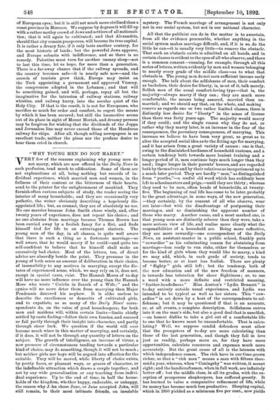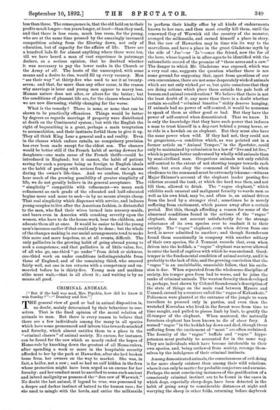".WHY YOUNG MEN DO NOT MARRY."
VERY few of the reasons explaining why young men do not marry, which are now offered in the Daily News in such profusion, tend much to edification. Some of them are not explanations at all, being nothing but records of in- dividual experience, which married men and women, in the fullness of their content or the bitterness of their hearts, send to the printer for the enlightenment of mankind. They furnish often curious subjects of study, the reader seeing the interior of many households ; and they are occasionally very pathetic, the writer obviously describing a hopelessly dis- appointed life ; but, as counsel, they are of absolutely no use. No one marries because John Smith chose wisely, and, after twenty years of experience, does not repent his choice ; and no one abstains from marriage because Thomas Brown has been carried away by a foolish fancy for a flirt, and finds himself tied for life to an extravagant slattern. The young man of the day, in all classes, is quite well aware that there is such a thing as a fortunate marriage—so well aware, that he would marry if he could—and quite too self-confident to believe that he himself shall make an excessively bad choice. Most of the letters, too, of direct advice are absurdly beside the point. They presume in the young of both sexes an amount of deliberation in their choice, of insensibility to any motives in marrying, except the dic- tates of experienced sense, which, we may rely on it, does not, except in special cases, exist. The Hannah Mores of to-day will have no more influence over the young than the Hannah More who wrote " Ccelebs in Search of a Wife; " and the cynics will no more deter them from marrying than Major Pendennis deterred his nephew. It is alike useless to describe the excellences or demerits of cultivated girls, and to expatiate, as so many of the Daily News' corre- spondents do, on the value of good housekeepers ; for both men and maidens will, within certain limits—limits chiefly settled by caste feeling—follow their own fancies, and succeed or fail partly through their insight into character, and partly through sheer luck. We question if the world will ever become much wiser in this matter of marrying, and certainly, if it does, it will not be through any quantity of letters on the subject. The growth of intelligence, an increase of virtue, a new pressure of circumstances tending towards a particular kind of choice, may do something, though it will not be much ; but neither girls nor boys will be argued into affection for the suitable. They will be moved, while liberty of choice exists, by pretty faces, or pleasant ways, or graces of character, or the indefinable attraction which draws a couple together, and not by any wide generalisation or any teaching from indivi- dual experience. tip to the end of time, in half the house- holds of the kingdom, whether happy, endurable, or unhappy, the reason why John chose Jane, or Jane accepted John, will still remain, to their most intimate friends, an insoluble
mystery. The French marriage of arrangement is not only not in our social system, but not in our national character.
All that the publicist can do in the matter is to ascertain, from all the evidence procurable, whether anything in the social system makes marriage difficult, and, if it is so, do the little he can—it is usually very little—to remove the obstacle. That such an obstacle exists is admitted on all hands, and in certain classes is evident to the eyes of all who observe; and there is a common consent—running, for example, through all this series of letters, written evidently by men and women belonging to nearly every grade of the middle class—as to what that obstacle is. The young men do not earn sufficient income early enough. The talk about the selfishness of men, their comfort as bachelors, their desire for liberty, is, most of it, talk merely, Selfish men of the usual comfort-loving type—that is, the majority—always marry if they can ; they are much more comfortable, the means being assured, married than un- married; and we should say that, on the whole, and making reserve as regards one or two rather limited classes, there is distinctly less desire for " liberty" in the sense of license than there was forty years ago. The majority would marry if they could ; and the single reason why they do not, or rather why they marry later, is an increase in the fear of the consequences, the pecuniary consequences, of marrying. This increase we believe to have been very great, so great as to alter the accepted social idea as to the fitting age for marrying, and it has arisen from a great variety of causes : one is that, owing to the diminished hardness of household customs, and a certain tendency both towards more lenient training and a longer period of it, men continue boys much longer than they used ; linger longer in their parents' houses, and are regarded both by themselves and by their relatives as inexperienced up to a much later period. They are hardly " men," as distinguished from " youths,"—a useful old word which has suddenly been left to schoolmasters and prigs,—until they are thirty ; whereas they used to be men, often heads of households, at twenty- five. The beginning of real life has come to be later, probably to the great advantage, in some ways, of the new generation, —they certainly, by the consent of all who observe, wear out later—but with the disadvantage of postponing their marriages, and so diminishing the apparent number of those who marry. Another cause, and a most marked one, is that young men are distinctly soberer than they were, take a more serious view of life, and realise more clearly what the responsibilities of a household are. Being more reflective, they are more cowardly—one correspondent of the Daily News, an assistant-master in a public school, frankly puts " cowardice " as his culminating reason for abstaining from marriage—less ready to run risks, either for themselves or for the kind of girls whom they would like to marry, a kind we may add, which, in each grade of society, tends to become better, or at least less foolish. There are plenty of " flighty " girls still left ; but the tendency, both of the new education and of the new freedom of manners, is towards less toleration for sheer flightiness ; or, to use a word with a more definite and restricted meaning, " feather-headedness." Miss Austen's "Lydia Bennett" is to-day entirely outside usual experiences, and Lydia was intended to be typical as well as her sisters. This " cow- ardice " is set down by a host of the correspondents to sel- fishness ; but it may be questioned if that is an accurate, or, at all events, a complete description. Selfishness enters into it on the man's side, but also a good deal that is unselfish, —an honest dislike to take a girl out of a comfortable life to one that he knows must be uncomfortable. That is calcu- lating? Well, we suppose candid defenders must allow that the youngsters of to-day are more calculating than those of the last generation, and though they fall in love just as readily, perhaps more so, for they have more opportunities, calculate resources and expenses much more accurately. But the great cause of all is the lateness with which independence comes. The rich have in our time grown richer, so that a "rich man" means a man with fifteen thou- sand a year, whereas, when " Coningsby " was written, it meant eight; and the handicraftsmen, when in full work, are infinitely better off ; but the middle class, in all its grades, with the ex- ception of prosperous shopkeepers, has suffered greatly. It has learned to value a comparative refinement of life, while its money has become much less productive. Sleeping capital, which in 1850 yielded as a minimum five per cent., now yields
less than three. The consequence is, that the old hold on to their profits much longer—ten years longer, at least—than they used, and that there is less room, much lees room, for the young, who are at the same time pressed by the amazingly increased competition arising from the filtering down, not only of education, but of capacity for the affairs of life. There are a hundred lads fit for almost anything where there were ten, till we have heard a man of vast experience in patronage declare, as a serious opinion, that he doubted whether it was necessary to pay the lower ranks in the Church or the Army at all. The hosts of the unoccupied, with some means and a desire to rise, would fill up every vacancy. Men " see their way" at thirty-five who used to see it at twenty- seven; and that, far more than any other cause, is the reason -why marriage is later and young men appear to marry less. Human nature does not alter, or alters for the better; but the conditions of pleasant life are, for the classes whose habits we are now discussing, visibly changing for the worse.
What is the remedy ? There is none, or none that can be shown to be practically efficacious. Things would be better by degrees as regards marriage if property were distributed at death on the Continental system ; but with the English the right of bequeathing is a great, perhaps a main temptation to accumulation, and their instincts forbid them to give it up. They all think King Lear a general and a sad reality. Even in the classes which endure entails, no compulsory provision has ever been made except for the eldest son. The chances would be better still if the French habit of saving dowers for daughters—one main cause of the French thrift—could be introduced in England; but it cannot, the habit of patient saving for such a purpose being as foreign to English ideals as the habit of parting with serious fractions of one's means daring the owner's life-time. And we confess, though we hear much of the growing possibility of greater simplicity of life, we do not greatly believe in its general acceptance. The -" simplicity " compatible with refinement—we mean such -refinement as each grade of the educated and half-educated begins more and more to seek—is by no means always cheap. That real simplicity which dispenses with service, and induces young couples to live after the American fashion, is distasteful to the men, who find their wives turned into nursery-maids, and bears even in America with crushing severity upon the women, who have to do the house-work, bear the children, and educate them all at once. It would be easier to find the young men's incomes earlier if that could only be done ; but the whole of the changes making in our social arrangements tend to make this more and more hopeless, or, at all events, difficult. The only palliative is the growing habit of going abroad young to seek a competence, and that palliative is of little value, for, of all who go, one-third " go under " from drink or sickness, one-third work on under conditions indistinguishable from those of England, and of the remaining third, who succeed fairly well, not one in ten returns with a competency and un-. married before he is thirty-five. Young men and maidens Alike must wait,—that is all about it ; and waiting is by no means all good.



































 Previous page
Previous page